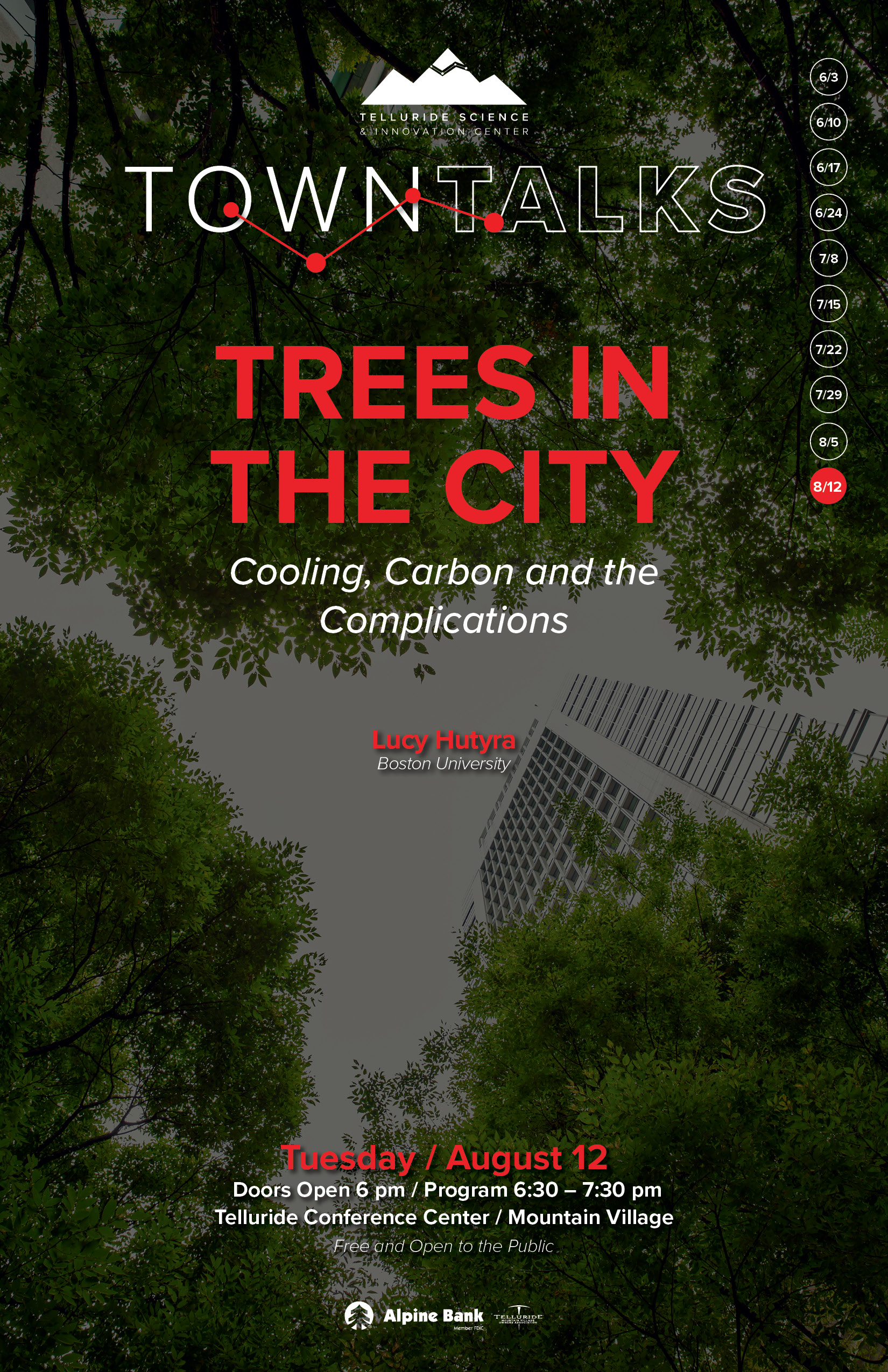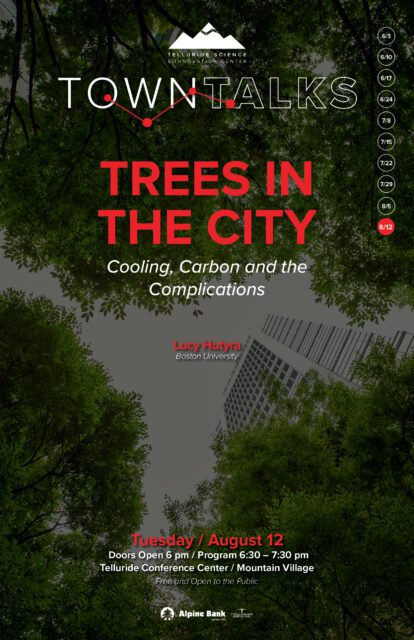
07 Aug Telluride Science Town Talk: City Trees–Cooling, Carbon & Complications, 8/12!
This coming week the 2025 Telluride Science Town Talks series continues with “Trees in the City: Cooling, Carbon, and the Complications.” The event features Dr.Lucy Hutyra and takes place Tuesday, August 12. Doors 6 p.m.; talk, 6:30 p.m
Town Talks are FREE and open to the public.
Visit telluridescience.org to learn more about Telluride Science and the capital campaign to transform the historic Telluride Depot into the Telluride Science & Innovation Center. The venue is the permanent home for Telluride Science and a global hub of inspired knowledge exchange and development where great minds get to solve great challenges.
The 2025 Telluride Science Town Talks series is presented by Alpine Bank with additional support from the Telluride Mountain Village Owner’s Association.
Go here for more about Telluride Science.
Go here for more on Town Talks

Heat waves, droughts, floods, wildfires, and hurricanes…
It is no secret that climate change is one of the most pressing issues of our time. Temperatures all around the globe are creeping up and posing threats to urban and rural areas alike. What’s interesting, however, is that factors unique to urban areas cause them to feel the effects of warming more intensely.
To drive that point home, on average, urban areas – which scientists often refer to as “heat islands”– are warming at a rate 29% faster than surrounding rural areas. Temperatures in urban neighborhoods with few trees can be more than 10 degrees Fahrenheit (5.5 Celsius) higher than in nearby suburbs. This phenomenon is largely due to the combination of pavement and scarce greenery prevalent throughout cities, which causes an oven-like effect because there is nothing to combat the heat.
While an AC may seem like a reasonable solution to fight extreme temperatures, it actually puts strain on electrical grids, costs households thousands of dollars annually, and emits even more heat back into the city.
So if AC can’t cool our cities, what can?
Short answer: trees.
During her upcoming Town Talk on August 12th titled “Trees in the City: Cooling, Carbon, and the Complication,” Dr. Lucy Hutyra will examine how trees grow in challenging urban environments and the ecological trade-offs they face. She will also explore how cities might balance green and built solutions to improve urban livability.
Dr. Hutyra is an urban ecologist on the forefront of solving the problem of excess heat in cities. She and her team integrate various disciplines and utilize tools like field observations, remote sensing, spatial analysis, and mathematical modeling to study carbon movement between the atmosphere and biosphere.
Using this research, Hutyra is able to examine how excess emissions affect the carbon cycle in cities and explore solutions to minimize rising temperatures. Through her work, she has found that climate solutions are not “one size fits all.” Each city’s unique characteristics such as water availability and existing infrastructure makes finding the right mix a top priority.
Although city trees may be sparse, they make up for it in power. Hutyra often cites the fact urban trees intake twice as much carbon dioxide as their sister rural trees. Such astounding productivity is not something to be ignored.
In addition to greenery, reflective roofs are a less space-consuming approach that also significantly decreases urban heat.
Cities may be heating up, but the solutions are too. From carbon-hungry urban trees to innovative cooling designs like reflective roofs, Dr. Hutyra’s groundbreaking work is one giant. step forward towards finding solutions to our warming cities.
Dr. Lucy Hutyra, morę:

In 1998, Dr. Lucy Hutyra began her higher education as an undergraduate student studying forest ecology at the University of Washington. Soon after, she spent a year doing fieldwork as a graduate researcher at Yale University.
Hutyra then investigated water exchange in the Amazon Rainforest at Harvard University where she completed master’s and doctorate degrees in earth sciences.
Hutyra returned to the University of Washington in 2007 where she spent two years as a research scientist learning urban ecology. She then joined the faculty of Boston University in 2009 and is currently a professor in the Department of Earth and Environment.
In 2023, Hutyra was selected to be one of 20 MacArthur Fellows. The fellowship awards individuals with a history of significant achievements and the promise for further groundbreaking work. Recipients of the fellowship receive a grant they are free to use as they see fit.
Hutyra has published in a variety of scientific journals, such as Proceedings of the National Academy of Sciences, Nature, Journal of Geophysical Research, and Global Change Biology, and Science of the Total Environment.


Sorry, the comment form is closed at this time.